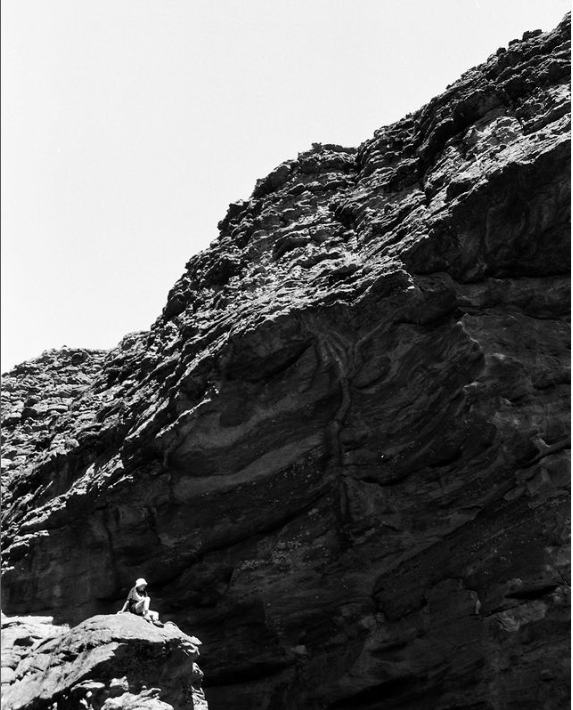Babyxxan's Sacred Drift

Babyxxan considers their changing relationship to sound and place and the unlikely rhythms that define it
It's a Tuesday afternoon when I call DJ, broadcaster and producer Xan Coppinger, aka Babyxxan. Xan is perched up a suburb and a half away in Abbotsford, Victoria. Their art, much like our conversation, is protracted and spacious, our dialogue undulating through their inner and outer musical universes and the moments that bridge the two.
Elwyn : A lot of your music incorporates recordings of natural and urban landscapes. What’s your relationship to place?
Xan Coppinger: When I began making music with field recordings, the initial idea was to create these small, fictional universes. I had previously practiced photography, but recording and documenting sonic slices of place in this way felt a lot more special. The way you position the microphone will determine how you revisit these places when you are physically absent. The music I created was to further this fictional reality the same way I would spend hours on sims creating these alternate universes that never really existed. When I re-listened, I was able to re-inhabit them along with all the memories that I had kept there.
I moved from South Africa with my family when I was quite young, and I’ve never felt really at home in South Africa or here in Melbourne, Naarm. I have travelled a lot but have never experienced a grounding elsewhere, making the act of travelling itself feel more homelike.
E: Your last EP Lost Tapes from the Lilac Islands in Space, along with your Skylab show, Porcelain Pool, celebrate auditory drifting and bathing. How do you approach these forms of music?
XC: With beatless music, I have always been able to sense a very distinct rhythm or movement. It feels like it ebbs and flows. When I was using synthesisers and vocal looping on the lost tapes, I was sticking to these cyclical waves that felt very rhythmic to me. I feel that to a huge extent with field recordings and soundscapes in general. I’m very aware of the natural tempos that surround us, be it through a bird singing or the sounds of a car moving over a bridge. The other day, I was cycling home and arrived at an intersection where the pedestrian button was emitting this beautiful sound. The tone and rhythm were incredible and proved exactly the beat I was looking for for this song that I was making. Wherever I am, I can pick up these urban or natural rhythms and hear them as beats or tempos.
E: Do these rhythms ever incite a physical response?
XC: I’m often running, cycling or climbing when I’m hearing these sounds. I’m quite bad at keeping still so I usually move in some format, which funnily enough triggers an inner stillness.
E: How do you mediate the macro and micro aspects of your recordings?
XC: I’m not sure if I have mediated so much. The microphone is dimensionally set up in space so you can place them in your field of sound. When you’re listening, you can identify and construct where in spaces the sound is coming from. I’ve always been drawn to the way that everything can be cacophonous. To deliberately try and remove a certain sound would be untruthful to a landscape that has been affected and transformed through colonisation. At first, I would have considered these sounds interruptions, but they are intrinsic to the landscape.
E: When did you sense a shift?
XC: All of the original field recordings I lost for Lilac Tapes happened because of a damaged hard drive. There was this moment where I was pretty distraught. Months of exploring new places and collecting field recordings vanished. It was a really important reckoning. I realised that these recordings were not mine and that I was wrong to think otherwise. I had this extractive perspective on these soundscapes, which entitled me to keep and capture them. These are sounds that belong to the land and the country. This reckoning helped me realise what it means to take field recordings in what we believe to be a demarcation between the urban and the natural.
E: Has this reckoning altered your process?
XC: After having those feelings, I stopped recording for a very long time. It didn’t feel good when I did it so I would just sit in the landscape, resisting the urge to capture sounds. It’s not to say I will no longer record soundscapes, but a reflective break to reimagine this form is needed.
At Dawn with Daria Kolosova: A Glimpse into one of Ukraine's emerging DJ talents
By Hugh Barton
Captivating Contemporary Experiences : Melbourne Recital Centre's 2024 Program
By Amelia Szabo
PROMPT AND CIRCUMSTANCE
By Olivia Bennett
RISING Returns to Melbourne with Golden Square, The Wilds, Patricia Piccinini and more
By Annabel Blue
Nuum: 'Heart Tape', a French Monastery, Tokyo and Pop Music
By Sarah Buckley
Collective escapism
By Hugh Barton